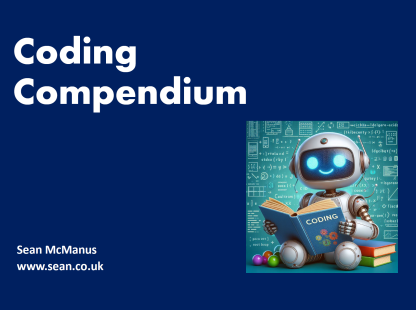
Coding Compendium
A free 100-page ebook collecting my projects and tutorials for Raspberry Pi, micro:bit, Scratch and Python. Simply join my newsletter to download it.
May 2009
Read my article below for the facts, and my novel Earworm, remastered in 2015, for the fantasy!
From the Beatles to Frank Zappa, bands have sung about being free. But they meant spiritually, not economically. At a time when music is being devalued, how can record labels fight back?
In the last five years, global record sales have plummeted from $32 billion to $19 billion (about 40%). There are a number of causes for the drop. There's much more competition for the entertainment pound today, including from DVDs and videogames. Sites like eBay enable a thriving second-hand market in CDs, too. Most fundamentally, as download sales have taken off, a new business model has taken hold. You don't have to buy the filler any more; you can just pay for the good songs on an album, or even just buy the b-sides from a single. As a result, the average sale value is dropping from the price of an album, to the price of a couple of tracks.
Record labels often claim that the decline is primarily down to piracy. In the 80s, the record industry protested that 'home taping was killing music'. Now that people can share music with thousands of people online and don't even have to exchange physical tapes, the financial damage from illegal copying has no boundaries.
The industry has tried to fight back against piracy using so-called 'digital rights management' (DRM) software on CDs or in downloads, which stops you copying or sharing songs you've bought. In practice, what happens is that paying customers are punished because they can't play their music on their iPods or car stereos, but a hacker somewhere finds a way around the protection and uploads the tracks to the internet for the whole world anyway. Legitimate music consumers are forced either to put up with a poor customer experience, or to learn how to crack the protection if they want to listen to the music they've bought.
At the same time, the industry sends a signal that music is a short-lived fashion accessory, limited to the lifespan of the hardware you play it on. How ridiculous would it have seemed in the 60s to buy a Beatles LP and be told you're only allowed to play it on three record players?
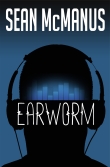 In my novel 'Earworm', a record label is so desperate to win back customers that it uses software hidden on their PCs to sell them music. At the time I was planning this, it seemed far-fetched that a record company would do such a thing, but it wasn't long before something similar happened.
In my novel 'Earworm', a record label is so desperate to win back customers that it uses software hidden on their PCs to sell them music. At the time I was planning this, it seemed far-fetched that a record company would do such a thing, but it wasn't long before something similar happened.
Sony BMG hid software on 50 audio CDs including albums by Celine Dion, Neil Diamond and Natasha Bedingfield. The copy prevention software used a 'rootkit', a technique typically used by hackers to hide malicious code on a computer, and it created security vulnerabilities that hackers were later able to exploit. Microsoft was among the security software vendors to describe Sony BMG's software as 'spyware'. In a statement on its website, Sony BMG denied it had done anything wrong, but a class action lawsuit resulted in a product recall and compensation to customers (including copies of the music they bought without any copy restrictions). As part of the settlement, if Sony BMG wants to use copy protection software in future, it must submit it for an independent security review first.
The DRM strategy has failed. Record companies are phasing DRM out, but combined with high profile prosecutions against children for music sharing, DRM has prompted many customers to lose their trust in the industry altogether.
One challenge is that the perceived value of music is falling too. In the 19th century, if you wanted to hear music, you had to be there while it was being performed. It was a luxury product. With the pace of life today, something as passive as just listening to an album seems curiously old-fashioned. Dr Adrian North of the University of Leicester conducted research in 2006 into listening habits. He said: "Music was rarely the focus of participants' concerns and was instead something that seemed to be taken rather for granted, a product that was to be consumed during the achievement of other goals. In short, our relationship to music in everyday life may well be complex and sophisticated, but it is not necessarily characterised by deep emotional investment."
Music is taken for granted, a product that is consumed during the achievement of other goals
At a time when music is ubiquitous, how can bands and record labels fight for attention? Increasingly, albums are given away for free, with newspapers becoming a key outlet for music distribution. They're in a unique position to distribute three million copies of an album to UK households in a single day. It seems like a perfect marriage but such giveaways devalue both music and journalism. It's hard to argue that people shouldn't copy music if you're giving it away with the telly pages, and with these deals newspapers basically concede that it doesn't matter what their writers produce; what sells papers is a good covermount
Both Prince and McFly gave away their albums through the Mail on Sunday to promote concerts, but record labels often strike such deals without involving the artists. Mike Oldfield was scathing about his record label EMI devaluing his 1973 masterpiece Tubular Bells by giving it away with the Mail on Sunday. "I feel the same as if I had lent something to somebody, and it had come back trashed," he told the BBC. Mail on Sunday editor Peter Wright claimed that sales of Tubular Bells rose after the giveaway, thanks to the extra publicity. But even now, over a year later, eBay is flooded with the freebie version.
Another album given away with the Daily Mail was Marillion's Misplaced Childhood, originally released in 1985. Band manager Lucy Jordache told me: "Record labels do get paid really well for these kind of deals, but the artist certainly didn't make the kind of money that the record company and the publisher made. Who benefits most? The newspaper, followed by the record company, followed by the publisher, followed by the band! It is good exposure, but it would have been nice if we could have added perhaps two new songs so people could hear what the band are doing NOW and not just live a nostalgia trip."
Now that the record industry has lost its monopoly on copying and distributing music, it needs to rethink its approach if it is to survive. Its future competition comes from past allies: the bands, concert promoters and big brands. Marillion has been using the internet to distribute directly to fans since 1999. Madonna has signed a deal with concert promoter Live Nation that covers not just tours, but also recordings, films and merchandise. Coffee chain Starbucks now has its own record label, with a roster that includes Bob Dylan, Paul McCartney and Carly Simon. (update in 2015: it looks like this has since been disbanded).

Radiohead photo by Sean McManus. More.
Radiohead bypassed the record label and let fans decide how much they wanted to pay to download the album 'In Rainbows' from the band's official website. The 'honesty box' approach enabled the band to reach out to new listeners and lapsed fans, who might be prepared to buy the album for a few pounds but would never buy it as a new release CD. Various surveys suggested the average price paid was £4-£5 and download numbers have been estimated at 1.2 million copies. Even after costs, Radiohead's slice of the revenues would have been much higher than the royalties on their old EMI record contract, which lapsed just before the release of 'In Rainbows'. When Radiohead released the album on CD through conventional record stores three months later, it still topped the album chart, so the activity didn't noticeably cannibalise the album's CD sales.
Nine Inch Nails (NIN), a Grammy-winning American industrial rock act, took Radiohead's distribution model and improved on it for a 36-track instrumental album called 'Ghosts I-IV'. The first nine tracks were available for free download, with the full album costing just $5 to buy. When you opened your zipped Radiohead album, all you got was a bunch of music files. When you open your NIN zip file, it's more like the experience you have when you buy a CD. Every song has its own photographic artwork and there's stuff to read. For those brought up on records, tapes and CDs, the artwork and sleevenotes can be an important part of the music experience.
Do we want a world where lyrics are approved by the PR director of a fast food company?
Radiohead and Nine Inch Nails have shown that established acts don't need the industry as much as it needs them. If more artists lose faith in the music industry and go it alone, who will invest in the next generation of artists? Big brand sponsorship has been mooted as the answer, but do we really want a world where lyrics are approved by the PR director of a fast food company?
There is still money to be made from music, though. At the same time that recorded music has been suffering from the internet effect, the live circuit has been buoyant. Ticket prices are rocketing, with shows typically selling out to touts on day one, and the secondary market being where many tickets are traded. Ticketmaster has even set up its own trading platform for ticketholders to sell to others, which means Ticketmaster can sell the same ticket twice. Nice stunt, if you can pull it.
You can't pirate the live experience. If you weren't there, you missed it.
One reason the live circuit is doing so well is that you can't pirate the live experience. If you weren't there, you missed it. Record labels are learning from this and the most innovative are thinking about other ways they can engage with customers, and how they can offer them a great experience.
Now that many music fans spend more time playing games than they do listening to radio or watching television, the opportunity to put music inside those games has become more highly prized. After a 15 year wait for new material, Guns'N'Roses released its first new track as a playable level in 'Rock Band 2', a game where players use imitation guitars, drums and a microphone to pretend to perform the music. Former Guns'N'Roses guitarist Slash, meanwhile, appears as a character in the guitar simulation game Guitar Hero III, and wrote music especially for it.
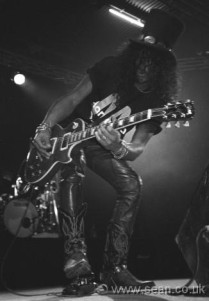
Slash photographed by Sean McManus. More.
The Grand Theft Auto series of games has distinguished itself in recent years with its soundtrack, which has led to a number of compilation albums being released based on the game's fictional radio stations. With the latest in the series, players in the US can send a text in the game while listening to a song on the radio. When they return to real life, they'll receive an email from the game developers with a link to where they can buy the song on Amazon.com. "Music has long played an integral part of the game playing experience," said Ronn Werre, executive vice president of EMI Music's Sales, Licensing and Synchronization unit, in a statement. "We think giving players the ability to identify and buy their favorite tracks from Grand Theft Auto IV's popular radio stations is a great new music discovery tool for fans and an innovative new revenue stream for artists."
Some artists and record labels have been exploring ways to connect with musicians. Radiohead sold the different stems of their song Nude for fans to remix. The band reported 2,252 remixes being uploaded to their website, and over 6 million unique visitors checking out the mixes, resulting in 461,090 votes for the best one. That song was in an awkward time signature, so the band expanded the experiment with a new track 'Reckoner'. Downloading the stems for remixing costs 79p from iTunes. Oasis gave away sheet music to three songs from their album 'Dig Out Your Soul' prior to the album's release in a promotion supported by music magazine NME, The Arts Council and sheet music company The Music Sales Group. The way to hear the new tracks first, was to learn to play them. Fans were invited to submit their performances to video website Youtube, with the best one winning a trip to see Oasis live. If you can't play music, the other way to hear the album first was to listen to some of New York's buskers who were also given sheet music before the album release.
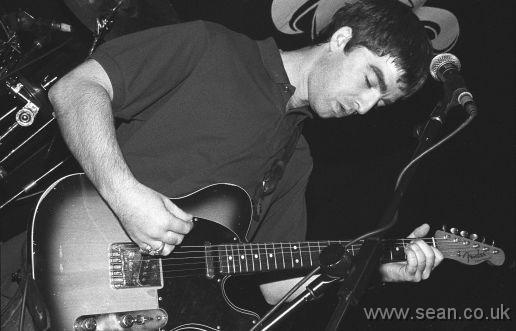
Noel Gallagher from Oasis photographed by Sean McManus. More.
Erasure found a way to offer a unique listening experience too: the band launched a website where fans could configure a unique version of the song 'Don't Say You Love Me'. Listeners choose between different synth, drum and vocal lines and hear a looping sample of the song as they switch between them. It costs £2 to download an MP3 of the full song. Each of the 40,000 unique versions of the track is sold only once, creating a limited edition of one. "In our concept all the possibilities are approved by the artists," says Marc-Henri Wouters, CEO and founder of Trust Media, the company behind the customisation technology. "Therefore you have a limited number of unique pieces and people can't lose the initial intent of the artist because the artist can approve all the possibilities. Concerning piracy, we do have the possibility to trace the legal owner of a version but up to now we haven't done so. What is more interesting with this concept is the fact that you don't make the value on the copy but on the personalisation. Actually, we have seen that the sharing of a version just pushes people to buy their own version."
To combat the piracy of conventional recordings, there has also been a trend towards increasingly lavish packaging of albums to justify the value added of the genuine release. Radiohead offered a luxury version of In Rainbows for £40 with unreleased tracks, and Nine Inch Nails provided the files for remixing the music with one of its album packages. David Gilmour's Live in Gdansk album came in five different formats with up to five discs of content and memorabilia including a poster and a plectrum. Depeche Mode's 2009 album 'Sounds of the Universe' was released in a 4CD version costing £60 and including two hardback books, a poster and postcards. U2's album 'No line on the horizon' came in six editions with an identical track list. Chris Rea even went so far as to write a faux biography to go with his rockabilly revival. The packaging has always been a part of music products, but in a digital era, it's one part that can't be easily pirated.
Record labels might have lost their monopolies, but they still have massive resources and there remains an insatiable demand for their content. For several years, the music business has behaved with the kind of arrogance usually associated with its top performers. DRM has treated every paying customer like a potential pirate, and labels have failed to justify their cut of the revenue to their major acts. The signs are there that the industry can bounce back: it's finding new ways to build memorable experiences around music, either by encouraging fans to interact with content in new ways or by attaching memorabilia. One thing is clear: if it is to survive, the music industry must learn to dance to a different tune.
A number of bands have turned their fan base into their patrons, including Marillion (which has asked fans to pre-order albums that had not yet been recorded), and ExileInside, which has invited fans to become investors since 2002.
Josh Freese, former drummer from Nine Inch Nails, has created 11 different packages for his album 'Since 1972'. At the low end, you can pay $7 to download the album and some videos. As you progress through the packages, you can collect more physical media and memorabilia (CD/DVD, t-shirts, signed drumsticks).
As you move up the packages, you also get more of Josh's time and personal effects:
Freese said on his own website (website no longer online): "I'm not expecting to sell any of those ridiculously priced packages but I sure did get a lot of good press and attention to the fact that I'm putting out a record because of it! Mission accomplished. We'll see what happens. AND if someone does pay to take my station wagon or have me join their band or go to PF Changs with 'em...... well then, we'll do it!"
Although the packages are tongue-in-cheek, they could show the way for famous bands to make money. A lot of bands already take on corporate gigs, and packages like this could enable them to charge for the kind of access that dedicated fans want. That might help to make up the shortfall as record sales fall.
 Sean McManus's novel 'Earworm' is a satire of the music industry, based around a major record label and all those who invest their hopes and dreams in it. The book is independently published and can be bought online now.
Sean McManus's novel 'Earworm' is a satire of the music industry, based around a major record label and all those who invest their hopes and dreams in it. The book is independently published and can be bought online now.
"Raising a number of surprisingly sophisticated issues, this book is enjoyably cynical about the seemingly cold-hearted and impenetrable nature of the record industry and peppered with a number of highly comical cameos from the cream of rock'n'roll, which ensures that it never feels like heavy going."
- Record Collector Magazine. More great reviews!
© Sean McManus. All rights reserved.
Visit www.sean.co.uk for free chapters from Sean's coding books (including Mission Python, Scratch Programming in Easy Steps and Coder Academy) and more!

A free 100-page ebook collecting my projects and tutorials for Raspberry Pi, micro:bit, Scratch and Python. Simply join my newsletter to download it.
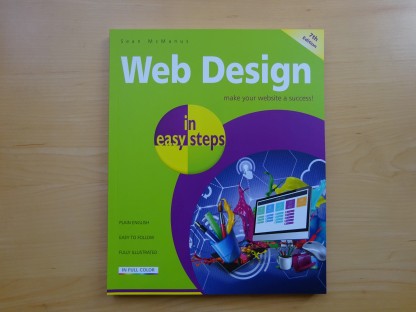
Web Design in Easy Steps, now in its 7th Edition, shows you how to make effective websites that work on any device.

Power up your Microsoft Excel skills with this powerful pocket-sized book of tips that will save you time and help you learn more from your spreadsheets.

This book, now fully updated for Scratch 3, will take you from the basics of the Scratch language into the depths of its more advanced features. A great way to start programming.

Code a space adventure game in this Python programming book published by No Starch Press.

Discover how to make 3D games, create mazes, build a drum machine, make a game with cartoon animals and more!